What we know about the Hamas attack on Israel, and Israel's response in Gaza
The Hamas militant group attacked Israel on Saturday, prompting Israeli Prime Minister Benjamin Netanyahu to declare, "we are at war." Israel says more than 700 Israelis, most of them civilians, have been killed since Hamas launched the coordinated, multi-fronted attack from the Gaza Strip, the Palestinian territory it has controlled for years.
At least nine U.S. citizens were also killed in the attacks, a National Security Council spokesperson confirmed Monday morning.
Almost 600 people had been killed by Israel's retaliatory airstrikes on the Gaza Strip, the enclave's Health Ministry said.
Here's what we know so far.
What happened?
Gaza's ruling Hamas militant group launched an unprecedented attack on Israel at daybreak Saturday, firing thousands of rockets as hundreds of Hamas fighters infiltrated the heavily fortified border in several locations by air, land and sea, catching the country off guard on a major holiday, Simchat Torah, a normally joyous day when Jews complete the annual cycle of reading the Torah scroll.
Israeli officials confirmed early on Monday that more than 700 Israeli civilians and members of the military had been killed. Another 2,150 were wounded.
In an assault of startling breadth, Hamas gunmen rolled into as many as 22 locations outside the Gaza Strip, including Israeli towns and other communities as far as 15 miles from the Gaza border. In some places they gunned down civilians and soldiers as Israel's military scrambled to muster a response.
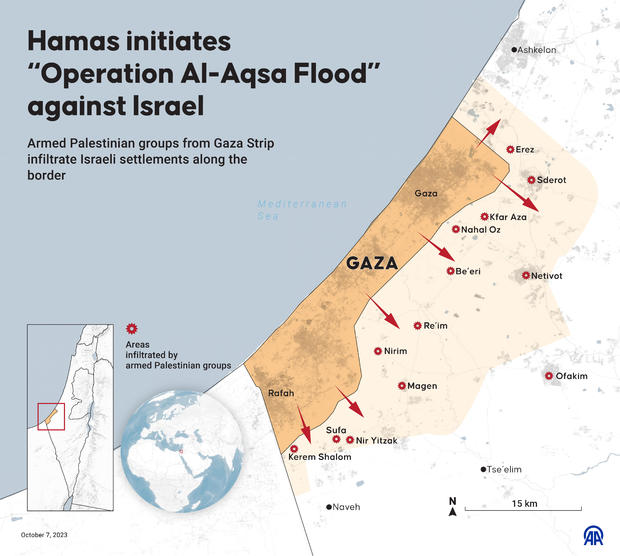
Rockets also struck Tel Aviv and other Israeli communities, slamming into homes and businesses.
Militants fired more rockets from Gaza early Sunday, damaging a hospital in the Israeli coastal town of Ashkelon, senior hospital official Tal Bergman said.
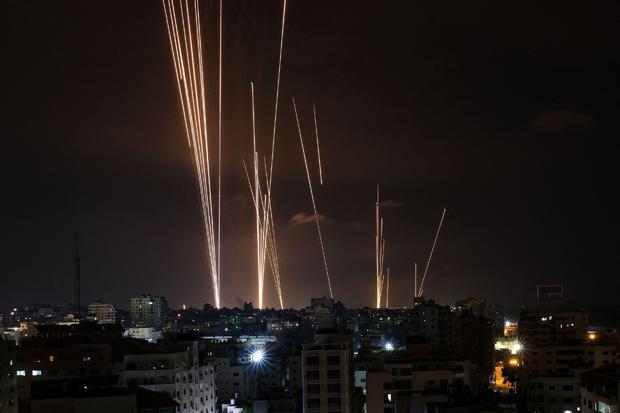
More than 250 mostly young people who had been attending a music festival near Kibbutz Re'im in the Southern Israeli desert were among the dead after Hamas militants entered the area and began firing into the crowd. Others were apparently dragged away as hostages. Haaretz, one of Israel's largest newspapers, described the scene as a "massacre" and a "battlefield," reporting that terrorists on motorcycles drove into the crowd shooting.
Hamas says it's holding "dozens" of Israeli civilians and soldiers captive in the Gaza Strip. Their capture marks a major escalation in the fighting. Secretary of State Antony Blinken said Sunday that the U.S. was working to verify reports that a number of American citizens were among those being held.
The Israeli military confirmed Saturday that Hamas militants were holding Israeli civilians and soldiers hostage in Gaza. The military did not say how many hostages were seized. Lt. Col. Richard Hecht, an Israeli army spokesman, confirmed that a "substantial" number of Israelis were abducted.
Israeli Ambassador Gilad Erdan accused Hamas of "blatant, documented war crimes."
Meanwhile, Israeli social media filled up with desperate pleas for information about missing friends and relatives and heart-wrenching tributes to loved ones, including whole families, slaughtered.
Gun battles and rocket fire continued Monday in Israel. An Israeli military official told CBS News that they had regained control of the communities around the Gaza Strip, but fighting had not ceased and there were still encounters with terrorists in the area.
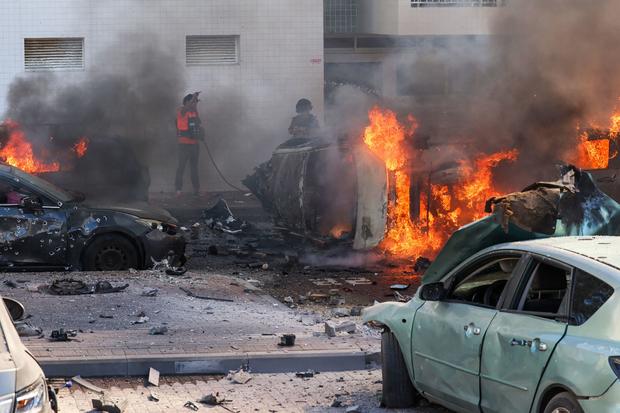
U.N. Secretary-General Antonio Guterres condemned the Hamas attacks "in the strongest terms," urged maximum restraint and stressed that violence can't solve the Israeli-Palestinian conflict.
Israel's response
In a televised address Saturday night, Israeli Prime Minister Benjamin Netanyahu, who earlier declared Israel to be at war, said the military would use all of its strength to destroy Hamas' capabilities. But he warned that "this war will take time. It will be difficult."
"The enemy will pay an unprecedented price," he said, promising that Israel would "return fire of a magnitude that the enemy has not known."
At least 560 Palestinians had been killed in retaliatory Israeli airstrikes on Gaza by Monday morning, Palestinian health officials said, with another 2,900 said to have been wounded. Israel's military said it was targeting command centers used by Hamas in the blockaded Gaza Strip, along with another Iran-backed militant group, Islamic Jihad.
The Israeli airstrikes in Gaza intensified overnight, flattening residential buildings in giant explosions, including a 14-story tower that held dozens of apartments as well as Hamas offices in central Gaza City.
Israeli Defense Minister Yoav Gallant said Monday that he'd ordered a tightening of the Gaza blockade: "Nothing is allowed in or out. There will be no fuel, electricity or food supplies," he said in a statement. "We fight animals in human form and proceed accordingly."
Loudspeakers atop mosques in Gaza City blared stark warnings to residents to evacuate, and by Monday morning the United Nations humanitarian agency OCHA said more than 123,530 people in the Palestinian territory had been internally displaced, "mostly due to fear, protection concerns and the destruction of their homes."
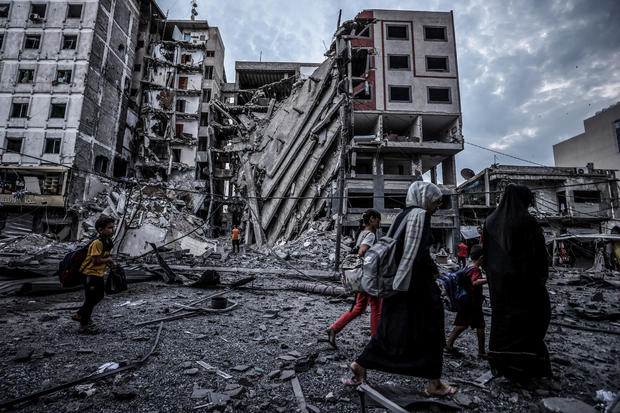
What is Hamas, and what's the Iran link?
Hamas is the Palestinian militant faction that governs the Gaza Strip, a 230-square-mile area where more than 2 million people live. Israel and the U.S. have designated Hamas a terror organization.
Hamas is backed by Iran and gets most of its funding and support from the Iranian regime.
"What I can say, without a doubt, is that Iran is broadly complicit in these attacks," U.S. deputy national security adviser Jon Finer said on "CBS Mornings" Monday. "Iran has been Hamas' primary backer for decades. They have provided them weapons. They have provided them training. They have provided them financial support. And so, in terms of broad complicity, we are very clear about a role for Iran."
Iran's Foreign Ministry on Monday denied reports that the country had a direct role in planning or carrying out the attack, with spokesman Nasser Kanani telling reporters in Tehran that the Palestinians had "the necessary capacity and will to defend their nation and recover their rights" without help from their primary benefactors in Tehran.
Hamas leader Ismail Haniyeh claimed in an address Saturday that the fight would expand to the Israeli-occupied West Bank, and to Jerusalem, Reuters reported.
"How many times have we warned you that the Palestinian people have been living in refugee camps for 75 years, and you refuse to recognize the rights of our people?" Reuters quoted Haniyeh as saying.
Hamas calls for Israel's destruction and has opposed past efforts at Israeli-Palestinian peace accords, using tactics including suicide bombings to attack the Jewish state.
Israel has maintained a blockade of Gaza since Hamas took control of the territory in 2007. The blockade, which restricts the movement of people and goods in and out of the enclave, has devastated the Palestinian territory's economy. Israel has defended the blockade as necessary to keep militants in Gaza from stockpiling weapons — though Hamas clearly managed to obtain an arsenal of rockets and other weaponry despite the restrictions.
Over the years, fighting has flared up repeatedly between Israel and Hamas and other militant groups based in Gaza, including the Iran-backed Islamic Jihad.
What have U.S. leaders said in response to the attack?
Officials across the U.S. responded quickly to condemn the Hamas attack.
"The people of Israel are under attack, orchestrated by a terrorist organization, Hamas," President Biden said Saturday in brief remarks at the White House. "I want to say to them and to the world, and to terrorists everywhere, that the United States stands with Israel."
The president said he was in contact with King Abdullah II of Jordan about the situation, along with U.S. congressional leaders. He said he'd directed his team to maintain contact with "leaders throughout the region."
"We'll make sure that they [Israel] have the help their citizens need, and they can continue to defend themselves," Mr. Biden added.
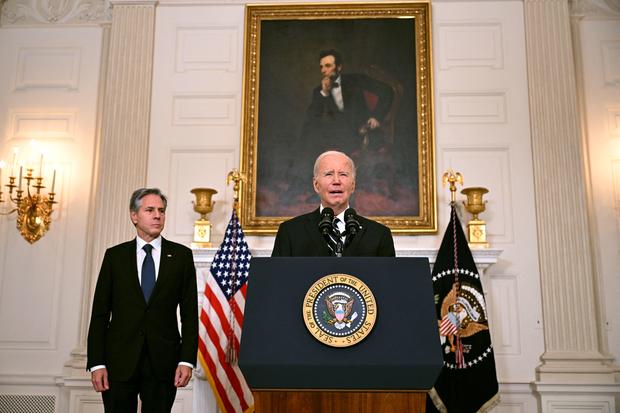
Leaders in New York and New Jersey condemned the attacks on Saturday. New York City Mayor Eric Adams, whose city is home to the largest Jewish population outside Israel, called the attack a "cowardly action by a terrorist organization."
Adams said city authorities are monitoring the situation for any possible threats to the local community.
"While there is no credible threat to New York City at this time, our administration is in touch with Jewish leaders across the five boroughs, and we have directed the NYPD to deploy additional resources to Jewish communities and houses of worship citywide to ensure that our communities have the resources they need to make sure everyone feels safe," Adams said in a statement.
Defense Secretary Lloyd Austin confirmed Sunday that the U.S. would be "rapidly providing the Israel Defense Forces with additional equipment and resources, including munitions."
Austin said he had directed the USS Gerald R. Ford Carrier Strike Group to the eastern Mediterranean, which includes an aircraft carrier and the Ticonderoga-class guided missile cruiser USS Normandy.
- In:
- War
- Terrorism
- Iran
- Hamas
- Israel
- Middle East
- Benjamin Netanyahu
Disclaimer: The copyright of this article belongs to the original author. Reposting this article is solely for the purpose of information dissemination and does not constitute any investment advice. If there is any infringement, please contact us immediately. We will make corrections or deletions as necessary. Thank you.

